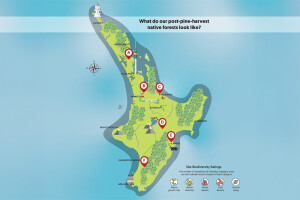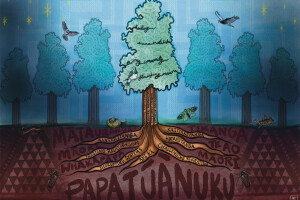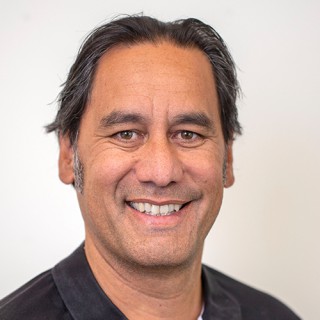Ki te kore te tāngata e manaaki i tōna taiao,
Ka kore te tāngata e whai oranga
If people do not take care of the environment,
We are not taking care of our own health and well-being
There is a Te Tiriti o Waitangi obligation on the part of agencies and institutions, including local and central government, to include mana whenua as genuine partners in any climate change adaptation approach, plan or policy. Kaihautū Māori Research Impact Leader Dr Shaun Awatere leads a team of researchers developing tools that support Māori communities make more informed climate adaptation decisions through a te ao Māori lens.
The Huringa Āhuarangi, Huringa Oranga: Changing Environment, Changing Well-being research programme recognises hapū and iwi in their role as kaitiaki by using both mātauranga Māori and science to build locally grounded climate resilience. Shaun says the research enables Māori to make informed decisions about climate change adaptation from a te ao Māori approach.
A te ao Māori perspective acknowledges the connections between people and te taiao and considers issues such as intergenerational equity. This includes mātauranga Māori and its implementation through Māori
technologies such as maramataka, tohu-based indicators, and locally embedded monitoring systems that inform policies for climate adaptation and are often context-specific, as part of an enduring legacy and a commitment to future generations in contrast to short-term exploitation.
Recent research (see the links below) proposes a disaster risk reduction and emergency management framework grounded in te ao Māori values and practices, addressing the legal and institutional barriers that inhibit the restoration of mana and tino rangatiratanga in current legislative settings. Their work highlights the need for a shift away from technocratic models towards mana-enhancing, place-based responses shaped by hapū and iwi leadership.
Shaun adds it’s important to engage with whānau, hapū, and iwi on a local basis to understand what the community needs to be resilient to a changing climate. This is consistent with recent work he co-authored in the journal Disasters, which demonstrates that adapting to climate change through nature-based solutions grounded in Indigenous knowledge – such as ecosystem regeneration at the landscape scale – provides not only ecological benefits but also strengthens cultural identity and intergenerational well-being.
The following two projects in the Huringa Āhuarangi, Huringa Oranga research programme support the empowerment of mana whenua by using te ao Māori approaches for natural resource management and climate change adaptation. The projects are centred around what whānau, hapū and iwi need to build resilience through using adaptive strategies.



